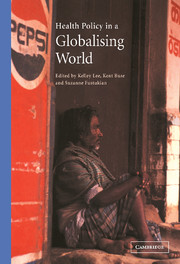Book contents
- Frontmatter
- Contents
- List of figures
- List of tables
- List of boxes
- Notes on contributors
- Foreword
- Preface
- Acknowledgements
- Abbreviations
- Part I
- 1 An introduction to global health policy
- 2 The public health implications of multilateral trade agreements
- 3 Globalisation and multilateral public–private health partnerships: issues for health policy
- 4 Global approaches to private sector provision: where is the evidence?
- 5 Regulation in the context of global health markets
- 6 Global policy networks: the propagation of health care financing reform since the 1980s
- 7 The globalisation of health sector reform policies: is ‘lesson drawing’ part of the process?
- 8 Cost-effectiveness analysis and priority-setting: global approach without local meaning?
- Part II
- Part III
- References
- Index
- References
6 - Global policy networks: the propagation of health care financing reform since the 1980s
Published online by Cambridge University Press: 22 September 2009
- Frontmatter
- Contents
- List of figures
- List of tables
- List of boxes
- Notes on contributors
- Foreword
- Preface
- Acknowledgements
- Abbreviations
- Part I
- 1 An introduction to global health policy
- 2 The public health implications of multilateral trade agreements
- 3 Globalisation and multilateral public–private health partnerships: issues for health policy
- 4 Global approaches to private sector provision: where is the evidence?
- 5 Regulation in the context of global health markets
- 6 Global policy networks: the propagation of health care financing reform since the 1980s
- 7 The globalisation of health sector reform policies: is ‘lesson drawing’ part of the process?
- 8 Cost-effectiveness analysis and priority-setting: global approach without local meaning?
- Part II
- Part III
- References
- Index
- References
Summary
Introduction
Over the last two or three decades, close scrutiny has been given to the issue of health care financing (HCF) in countries at different levels of economic development. The desire for alternative or complementary ways to generate financial resources for health care has in part been driven by need, namely resource shortages and rapidly rising costs. At the same time, however, policy choices have been influenced by particular ideas and values concerning the role of the state, and its perceived responsibilities to finance and provide health care.
Traditional approaches to the study of public policy have focused on the national level and, in particular, the role of the state and government actors as the holders of formal authority to take decisions on behalf of the public interest (Anderson 1975; Rose 1975; Frederickson and Wise 1977). This has been particularly evident in health policy analysis. While certain non-state actors (e.g. private companies, professional associations) have long been recognised as important to public policy-making, they have largely been described as interest groups seeking to influence (e.g. lobbying) a formal process that is essentially focused on the state and its government. Given that the state is taken as the primary unit of analysis, international health is largely equated with comparative analyses of national health policy-making (Leichter 1979)
Since the mid 1980s, analysis of health policy has changed in two main ways. First, there has been recognition of the greater significance, both quantitatively and qualitatively, of non-state actors.
- Type
- Chapter
- Information
- Health Policy in a Globalising World , pp. 97 - 119Publisher: Cambridge University PressPrint publication year: 2002
References
- 8
- Cited by



